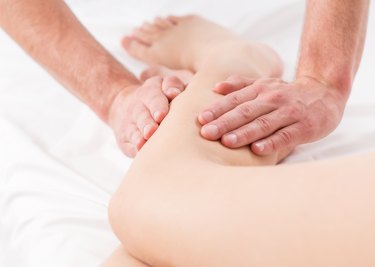
You exercise to slim down and shape up — so it's no wonder you're alarmed when you end a tough workout and your legs appear larger and more swollen then when you started. Swelling can be a result of micro-trauma to your muscles that occurs during exercise, but can also be a sign of a serious condition that needs medical attention.
Venous insufficiency, water retention as a result of kidney or heart disease, and hormonal issues are possible reasons for leg swelling after exercise. If you find the swelling isn't easily resolved, causes pain or achiness, and happens consistently, you should consult your doctor.
Video of the Day
Video of the Day
Micro-Trauma and Swelling
When you exercise, your muscles incur stress. The fibers tear and stretch. This is what makes exercise valuable. Your body responds to this trauma by repairing and growing stronger and more resilient. The initial stress increases blood flow to affected areas, however. As the blood and fluids rush in to repair the "stressed" areas, you may experience some swelling.
To relieve leg swelling after exercise, wear compression calf sleeves post-workout and get off your feet. You may even borrow a pose from yoga: Legs Up the Wall. Lie on your back with your feet propped up against a wall. Remain in the position for 5 to 10 minutes to reverse the flow of blood and alleviate swelling.
Swelling From Injury
It should go without saying that a twisted ankle, torn muscle or broken bone in your leg could lead to inflammatory swelling. If you have an injury, you likely felt it and it'll only affect the leg that's injured, not both. Consult a doctor for immediate treatment.
Disease and Swelling
Fluid retention in your legs can be a symptom of underlying heart, kidney, liver or endocrine disease. Complications in these organs and bodily systems interfere with your body's ability to move fluid through your body via the lymphatic or circulatory system.
Exercise can aggravate the pooling of fluids, so the swelling becomes more obvious right after you work out. But if you experience swelling at other times, even if it seems minor, definitely head to the doctor.
Swelling and Veins
Swelling in your legs may be a result of failing veins, such as in the case of spider and varicose veins. Normally, the valves in your leg veins work one way to move blood up toward your heart. When these valves fail, the blood gets backed up, causing swelling.
When you exercise, blood flows more rapidly and in greater volumes, so it can exaggerate swelling due to varicosity. Speak to a vein specialist about possible resolution. Medical-grade compression stockings often help resolve uncomfortable vein issues. Minor surgical procedures may be necessary in more severe cases.
Pregnancy and Hormones
Pregnancy can be another cause of the edema, or fluid retention, in your legs post-exercise. Exercising while pregnant is healthy, but talk to your ob-gyn about how often and the type that's best for you.
When exercise exacerbates swelling in your legs during pregnancy, talk to your doctor about ways to alleviate the discomfort. Compression stockings and water exercise might be ways to keep you moving without as much edema.
Even if you aren't pregnant, hormonal changes that occur with your cycle can make you retain water. If you're a woman and the swelling occurs at the same time each month, it may be due to changes in your hormone levels that happen during premenstrual syndrome or PMS. The hormonal ups and downs that occur with menopause can also cause leg swelling that's most apparent after exercise.
Read more: Vitamin Deficiency and Leg Pain
Is this an emergency? If you are experiencing serious medical symptoms, please see the National Library of Medicine’s list of signs you need emergency medical attention or call 911.